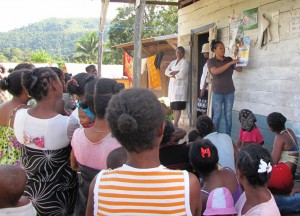November 14, 2013 — A new conservation partnership aims to promote family planning in Madagascar, report Charlie Welch and Dr. Erik Patel of the Duke Lemur Center:
 This October, a women’s reproductive health specialist visited the village of Belaoka Lokoho (adjacent to Marojejy NP, 15km from Andapa) to offer local women the option of contraception. The prearranged visit was supported by SAVA Conservation — a Duke Lemur Center conservation initiative in northeastern Madagascar that began in 2012 — and carried out by the NGO Marie Stopes International. The nurse was met by a very enthusiastic group of 32 women from 14 to 40 years of age, all of whom, including the youngest, already have children. The majority of the women received arm-implants (which is a fifteen minute outpatient procedure), although IUDs were an option as well. The arm-implants have a three-year period of efficacy.
This October, a women’s reproductive health specialist visited the village of Belaoka Lokoho (adjacent to Marojejy NP, 15km from Andapa) to offer local women the option of contraception. The prearranged visit was supported by SAVA Conservation — a Duke Lemur Center conservation initiative in northeastern Madagascar that began in 2012 — and carried out by the NGO Marie Stopes International. The nurse was met by a very enthusiastic group of 32 women from 14 to 40 years of age, all of whom, including the youngest, already have children. The majority of the women received arm-implants (which is a fifteen minute outpatient procedure), although IUDs were an option as well. The arm-implants have a three-year period of efficacy.
So, why is SAVA Conservation involved in family planning? Population growth is known to be one of the major drivers of forest (and biodiversity) loss, which is known to be high in northeastern Madagascar. NASA’s ‘Global Forest Disturbance Alert System’ (GloF-DAS)recently identified high levels of deforestation in northeastern Madagascar even when compared to many other parts of the world. Many organizations are embracing new integrated Population, Health, and Environment (PHE) programs.
Madagascar’s population growth rate is among the highest in the developing world, growing at the disturbing rate of 2.9%, with an average fertility rate of 4.5 births per woman. In some regions, the population is predicted to double within 15 years. With the majority of the population relying on subsistence agriculture for survival, more people means more pressure on the remaining forests of the region as well as posing more challenges for children’s well-being. Nearly 50% of the population is already below the age of 15, and the incidence of childhood poverty in Madagascar is known to be strongly positively correlated with the number of children per household. More than 50% of Malagasy children exhibit stunted growth due to poor diet (Harris et al. 2012; UNICEF 2010).
It has often been reported that women in Madagascar frequently desire more access to information about contraception and service practitioners. National statistics show that only 29% of women married or in a sexual relationship have access to modern contraception (Harris et al. 2012). Like other environmental ngos nationally, SAVA Conservation made the decision to support the women’s health NGO, Marie Stopes, to offer local women in the Marojejy National Park periphery the choice of contraception. It was not a decision that we took lightly, and by choosing Marie Stopes as a partner, we are collaborating with an NGO which has much expertise and experience working in family planning in Madagascar. Marie Stopes has been working in Madagascar for 20+ years, providing women with reproductive options, and their “Ladies” (nurses) are already working in the SAVA region. We are giving them the means to expand their services into an area that they would not have otherwise been able to reach out to.
Community-based conservation takes many forms, and by working with local people to improve their lives we hope to also build trusting relationships. Trusting relationships open the door for conservation action and forest protection.
References
Harris A., Mohan V., Flanagan M., and Hill, R. (2012). Integrating family planning service provision into community-based marine conservation. Oryx 46(2): 179 – 186.
UNICEF (2010). Etude sur la Pauvreté et les Déprivations des Enfants à Madagascar et Peace and Conflict Impact Assessment. Revue mi-année 2010. UNICEF Madagascar, Antananarivo, Madagascar.
Dr. Erik R. Patel is the Post-Doctoral Project director for Duke Lemur Center’s SAVA Conservation Project. He has been working in northeastern Madagascar for 12 years.


